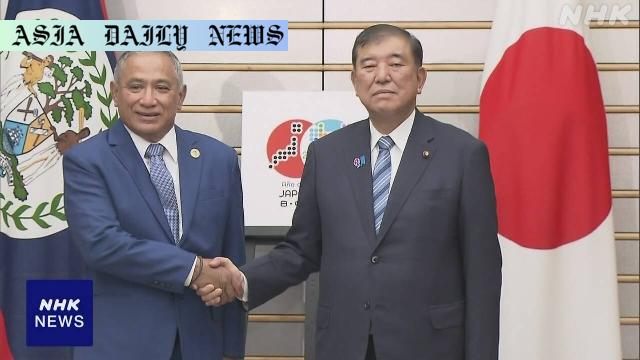Rule-based Order: Japanese and Belize leaders work to strengthen the international order grounded in principles of law.

Strengthening the Rule-based International Order
In a significant bilateral meeting, Japanese Prime Minister Ishiba Shigeru and Belize Prime Minister John Briceno expressed their commitment to fortifying the global rule-based order in a time of increasing challenges to international norms. The leaders declared their countries’ shared values, including firm adherence to the principles of law and shared democratic values, as fundamental to global stability and peace.
Held in Tokyo, their discussions centered on the evolving threats to an open, free, and fair international landscape, ranging from growing geopolitical tensions to economic uncertainties. A unified stance from both nations aligned their policies for addressing issues that diminish the global order.
Economic and Exchange-based Cooperation
Both leaders acknowledged the critical importance of developing deeper multi-dimensional partnerships, particularly in economic collaborations. Recognizing the potential for mutual value, Japan and Belize committed to facilitating projects that bolster sustainable development while fostering job creation and economic growth in each economy.
Additionally, the joint acknowledgment of exchange programs highlighted the nations’ shared desire to deepen cultural, educational, and technological ties. Such initiatives, they noted, would promote cross-border understanding and pave the way toward building a stronger global narrative on partnership and teamwork.
A Shared Vision in Uncertain Times
The joint press conference offered a glimpse into the cautionary yet optimistic sentiments surrounding global order. PM Ishiba emphasized the urgency of defending democratic norms: in doing so, both leaders not only discussed their respective nations’ commonalities but also reconvened policies aimed to inspire like-minded nations worldwide.
It’s clear that these discussions, though bilateral, could potentially influence global cooperation. Japan’s leadership in hosting and shaping dialogues around high-profile events such as the World Expo was emblematic of its commitment to these international principles.
Commentary
Strengthening the Global Consensus
The recent meeting between the Prime Ministers of Japan and Belize underscores a critical moment for global diplomacy. At a time when international norms and the rule of law are increasingly under threat, partnerships like these serve as a beacon of hope for those advocating for a collaborative and orderly international system.
Japan has long been a steadfast proponent of the rule-based order, leveraging its economic power and political influence to champion global stability. Belize, though smaller in size and economy, brings its commitment to democratic principles and international law to the table. This cooperation is a powerful reminder that size does not equate to influence when values align.
The Broader Implications of Bilateral Cooperation
The agreement to deepen relations in economic and cultural exchanges is a particularly exciting development. Economic cooperation can act as the bedrock of stronger diplomatic relationships, creating interdependencies that make conflict less likely and cooperation more rewarding. The inclusion of cultural and educational exchange programs suggests a long-term vision, one where shared understanding becomes the foundation for sustained partnership.
At a time when many nations are turning inwards and rejecting global initiatives, the collaborative spirit between Japan and Belize sets a refreshing precedent. Their partnership demonstrates that even countries with vastly different scales of power can find common ground and work toward mutual goals.
Renewing Faith in the Rule-based Order
Perhaps the most significant takeaway from this meeting is the reaffirmation of the rule-based international order. In a world where unilateral actions and disregard for international norms are unfortunately becoming more commonplace, this bilateral commitment sends a strong message of resistance to chaos and disorder.
As observers, we can only hope that this partnership inspires other nations to revisit their own commitments to the global order. It is through such collaborative efforts that the international community can hope to navigate the complex challenges of the 21st century.


